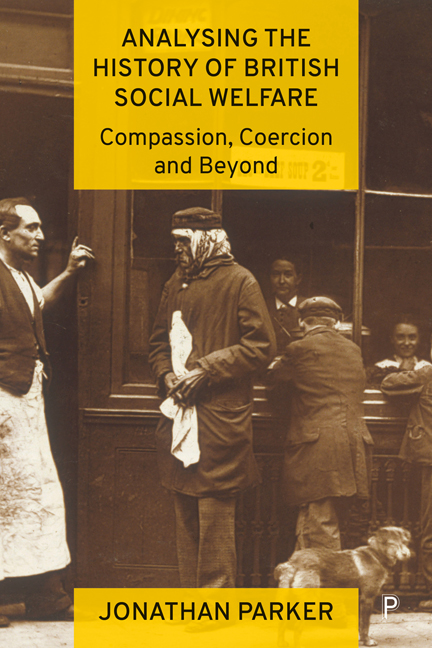Book contents
- Frontmatter
- Contents
- List of tables
- List of abbreviations
- About the author
- Acknowledgements
- 1 Concepts, continuities and critique
- 2 A brief history of British social welfare
- 3 Philosophical binaries and normative judgements
- 4 Chocolate, flowers and social welfare reform
- 5 War: the paradoxical crucible of welfare reform
- 6 Gendered perspectives on welfare
- 7 Piacular austerity: sacrificing the poor for the rich
- 8 Universal Credit versus Universal Basic Income: strange bedfellows?
- 9 Universal Credit versus Universal Basic Income: strange bedfellows?
- 10 W(h)ither welfare after Brexit and COVID-19?
- References
- Index
9 - Universal Credit versus Universal Basic Income: strange bedfellows?
Published online by Cambridge University Press: 20 January 2024
- Frontmatter
- Contents
- List of tables
- List of abbreviations
- About the author
- Acknowledgements
- 1 Concepts, continuities and critique
- 2 A brief history of British social welfare
- 3 Philosophical binaries and normative judgements
- 4 Chocolate, flowers and social welfare reform
- 5 War: the paradoxical crucible of welfare reform
- 6 Gendered perspectives on welfare
- 7 Piacular austerity: sacrificing the poor for the rich
- 8 Universal Credit versus Universal Basic Income: strange bedfellows?
- 9 Universal Credit versus Universal Basic Income: strange bedfellows?
- 10 W(h)ither welfare after Brexit and COVID-19?
- References
- Index
Summary
Ambivalence towards social workers was illustrated clearly at the end of the year 2021 in the trial of the father and step-mother of six-year-old Arthur Labinjo-Hughes and the conviction of the step-mother and mother of murdered 16-month-old Star Hobson. Calls for a review of children's social work and blame of social workers for not protecting children populated the press and social media (Change.org, 2021; Townsend, 2021) while others pointed to systemic underfunding, complexities resulting from school closures and actions to curb the COVID-19 pandemic and the centrality of human relationships in safeguarding work (Ferguson, 2021). Contemporary ambivalences echoed the 1987 cartoon by Kal depicting the (spot-thedifference) lynching of one social worker for taking a child into care and another for leaving a child in an abusive family (Doel, 2017).
This chapter considers formalised welfare illustrated through the development of social work as an accepted and, indeed, necessary function of capitalist societies, but also as a potential societal irritant challenging the status quo and systemic inequities. The history of social work is explored through its diverse beginnings in bolstering the social system while advocating radical political and community change (Payne, 2005; Bamford and Bilton, 2020; Burt, 2020; Jones, 2020). The development of social work practice, and education, within the personal social services is interlinked with changes and developments in social policy. As Pinker notes, since 1970 social services have seen the radical restructuring of the organisation and functioning of statutory and non-statutory social work agencies and in professional social work education (see Offer and Pinker, 2017). In this context, we present the idea of social work as an ambiguous state regulated and promoted profession that seeks, in a Foucauldian sense, to ‘discipline’ its subjects whether those subjects are social workers themselves or the citizens they work with (Foucault, 1991). Somewhat differently, social work is also considered as offering a critique of the existing system, showing its flaws and lobbying for social reform and change. We draw on earlier work on ambivalence and historical shifts and turns in social work (Parker, 2020; Parker and Frampton, 2020).
- Type
- Chapter
- Information
- Analysing the History of British Social WelfareCompassion, Coercion and Beyond, pp. 149 - 169Publisher: Bristol University PressPrint publication year: 2023



